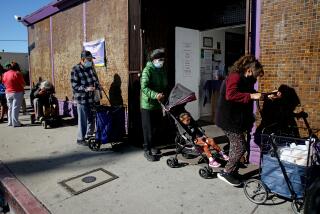Affordable Housing Matters
- Share via
What does the housing shortage in Los Angeles mean for a hard-working mother who spends more than half of her paycheck on rent? It means cereal for dinner. It means her son can’t try out for the basketball team because he has to work after school.
Things are tight for thousands of workers who can’t afford to live within a reasonable distance of their workplaces. The federal definition of housing affordability is paying 30% of income or less for shelter. That means affordable rent would be less than $350 for the 750,000 Southern California workers who earn the minimum wage.
Reducing the affordable-housing crisis will require creating thousands of subsidized rental units from the ground up or renovating slum housing. Examples of the latter are the apartments along Estrella Avenue near USC that have been renovated by the nonprofit Esperanza Community Housing Corp. Rents can range from $250 to $600 per month, and waiting lists are long.
In past decades, Washington put up most of the money for low-cost housing. Since 1980 the responsibility for financing low-rent housing has shifted largely to nonprofit developers, charitable foundations and City Hall.
Mayor James K. Hahn, the City Council and the downtown business community support an annual $100-million housing trust fund. The question, which will be taken up Nov. 14 before the council’s Housing and Budget committees, is where to find that much money. The housing department now recommends an initial goal of $70 million because of post-Sept. 11 economic realities.
The mayor and council should start with the city’s federal Community Development Block Grant money. Los Angeles gets more than $100 million in these discretionary funds, which politicians love because they can be used for many purposes. There are other good options for finding money for the housing fund. A slight increase in the document tax on real estate transactions could add as much as $10 million a year to the trust. A new state law that makes it easier for cities to catch scofflaws who don’t pay local business license fees could add $5 million through a one-time amnesty. Every year the city’s Department of Water and Power brings in more money than is spent. The excess flows into the general fund; perhaps $10 million of that could be sent to the housing trust.
The trust fund will not get any money from the $50 billion committed to housing by mortgage investment giant Fannie Mae. Nor will the Fannie Mae money be used to increase the number of low-rent apartment buildings. Those funds will be used primarily to help moderate-and middle-income families, including those of police officers and teachers, buy homes with as little as $500 down.
Affordable housing matters, and not just for the desperately poor. Los Angeles will continue to thrive economically only if it maintains a delicate balance: making the city friendly to business development while encouraging more affordable housing for the workers needed to keep the wheels turning.
More to Read
Sign up for Essential California
The most important California stories and recommendations in your inbox every morning.
You may occasionally receive promotional content from the Los Angeles Times.





